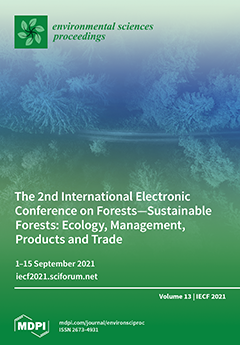Ink disease and chestnut blight of European chestnut (
Castanea sativa) represent the two major threats for chestnut orchards and coppice forests in Greece. Interestingly enough, the application of biological control of chestnut blight by introducing
Cryphonectria hypovirus CHV1 on a nationwide
[...] Read more.
Ink disease and chestnut blight of European chestnut (
Castanea sativa) represent the two major threats for chestnut orchards and coppice forests in Greece. Interestingly enough, the application of biological control of chestnut blight by introducing
Cryphonectria hypovirus CHV1 on a nationwide scale has been successful in limiting the disease. However, ink disease seems to be an increasing threat as it has caused considerable losses recently. For this reason, the occurrence of the disease was investigated and a distribution map of
Phytophthora spp. has been created. In this study, the presence of ink disease was confirmed all over the country and the
Phytophthora species associated with the disease were recorded. Soil and tissue samples were collected and the obtained
Phytophthora isolates were identified on the basis of their morphological characteristics and molecular identification using the ribosomal internal transcribed spacer region (rDNA-ITS). Regarding sequence analysis, the ITS1-5.8S-ITS2 region of the isolates was amplified using primers ITS4 and ITS6. Therefore, seven different species have been detected in total, based on morphology and sequence analysis of one genomic region.
P. cambivora,
P. cinnamomi, and
P. cryptogea were recovered from soil and tissue, while
P. plurivora,
P. cactorum,
P. gonapodyides, and
P. citrophthora were isolated only from soil. More specifically, the relative percentage of
P. cambivora and
P. cinnamomi isolates was 82 vs. 18%. Although
P. cambivora is the prevailing species in chestnut orchards and natural coppice stands, the recent record of the more aggressive
P. cinnamomi is considered a potential major threat to
C. sativa in Greece. As
P. cinnamomi was isolated from different chestnut orchards, it is most likely that the specific
Phytophthora species was introduced through transport of infected nursery material. The nationwide distribution of the disease and the severe losses of trees demand the implementation of appropriate control measures. The crucial role of the irrigation practices adopted by the chestnut growers is considered the primary reason for the emergence of ink disease in Greece.
Full article



